- Home
- Rosanne Hawke
The Truth About Peacock Blue
The Truth About Peacock Blue Read online
The Truth about Peacock Blue is based on Rosanne Hawke’s short story, ‘Just a Schoolgirl’, in Kennedy, M. (ed.), Reaching Out: Stories of Hope, Sydney: HarperCollins, 2013.
First published by Allen & Unwin in 2015
Copyright © Rosanne Hawke 2015
The moral right of Rosanne Hawke to be identified as the author of this work has been asserted by her in accordance with the United Kingdom’s Copyright, Designs and Patents Act 1988.
All rights reserved. No part of this book may be reproduced or transmitted in any form or by any means, electronic or mechanical, including photocopying, recording or by any information storage and retrieval system, without prior permission in writing from the publisher. The Australian Copyright Act 1968 (the Act) allows a maximum of one chapter or ten per cent of this book, whichever is the greater, to be photocopied by any educational institution for its educational purposes provided that the educational institution (or body that administers it) has given a remuneration notice to the Copyright Agency (Australia) under the Act.
Allen & Unwin – Australia
83 Alexander Street, Crows Nest NSW 2065, Australia
Phone: (61 2) 8425 0100
Email: [email protected]
Web: www.allenandunwin.com
Allen & Unwin – UK
c/o Murdoch Books,
Erico House, 93–99 Upper Richmond Road, London SW15 2TG, UK
Phone: (44 20) 8785 5995
Email: [email protected]
Web: www.allenandunwin.com
Murdoch Books is a wholly owned division of Allen & Unwin Pty Ltd
A Cataloguing-in-Publication entry is available from the National Library of Australia www.trove.nla.gov.au. A catalogue record for his book is available from the British Library.
ISBN (AUS) 978 1 74331 994 9
ISBN (UK) 978 1 74336 763 6
eISBN 978 1 92526 815 7
Cover and text design by Debra Billson
Cover photos: portrait of girl by Getty Images/azgAr Donmaz; additional images by
Shutterstock and CanStock Photo
Typeset by Midland Typesetters, Australia
For Asia Bibi and all those unjustly accused
We must accept finite disappointment,
but never lose infinite hope.
MARTIN LUTHER KING JR
Hope means hoping when everything seems hopeless.
GILBERT K CHESTERTON (1874–1936)
Act justly, love mercy, and walk humbly with God.
MICAH 6:8
CONTENTS
CHAPTER 1
CHAPTER 2
CHAPTER 3
CHAPTER 4
CHAPTER 5
CHAPTER 6
CHAPTER 7
CHAPTER 8
CHAPTER 9
CHAPTER 10
CHAPTER 11
CHAPTER 12
CHAPTER 13
CHAPTER 14
CHAPTER 15
CHAPTER 16
CHAPTER 17
CHAPTER 18
CHAPTER 19
CHAPTER 20
CHAPTER 21
CHAPTER 22
CHAPTER 23
CHAPTER 24
CHAPTER 25
CHAPTER 26
CHAPTER 27
GLOSSARY OF URDU AND ARABIC (A) WORDS
NOTES
ACKNOWLEDGEMENTS
ABOUT THE AUTHOR
CHAPTER
1
The night Ijaz died, I didn’t even dream of him. I thought I would have known, but I woke in the morning to the sound of my mother’s wailing. He had died in his sleep. Some say that is the best way to die but he was only fifteen.
I remember the funeral as if it were a black-and-white silent movie. Everyone in the village rallied for it and other relatives began arriving in the afternoon. In the house Ammi cried over the coffin; I saw her open mouth, the way she shook, but I couldn’t comfort her. She even pulled open the lid in front of everyone and dragged him to her breast, banging him on the back, rocking back and forth.
I wanted to say, Wake up, Ijaz! In my head I was shaking him but I was far away, watching as if from a high cloud. Maybe tomorrow life would be normal and I’d return to earth, to feel again.
Ijaz and I were close. He was often inside due to his breathing and, since Abba was a tailor, he had taught him how to sew shalwar qameezes, the baggy trousers and long shirts everyone wears. I embroidered around the necklines and cuffs. Our grandmother Dadi-ji had taught me the Punjabi phulkari designs using a simple satin stitch, even though she couldn’t see well enough to embroider clothes anymore. I loved the way coloured thread could make a garden of flowers appear on a qameez.
Ijaz and I were a good team; even in church he played the tabla, a hand drum, with our cousin Sammy while I sang. Why couldn’t he have stayed alive? It wouldn’t have been any trouble at all for God to fix his lungs.
Our family from further south in Pakistan came on buses for the funeral: our cousin Barakat, with whom Ijaz used to correspond on Facebook, and his two sisters. Ijaz and I first met him after the big monsoon flood when I was ten. Our mud houses didn’t hold up against the raging river and the village had to be rebuilt. Uncle Yusef from Australia came to help, even though he knew nothing about building. He paid for cement so the school and church would be pukka. A flood would never dissolve them again.
I followed the procession to church; Sammy and Barakat were carrying Ijaz’s coffin along with Abba and my uncles. Inside the church, there were prayers about the surety of eternal life. We all knew where Ijaz was but that didn’t make his passing any easier to bear. Later at the cemetery Colonel Rafique and Mrs Rafique, in whose house Ammi worked, arrived and stood near Dadi-ji, as if they, also, were grandparents. Sammy stood beside me. He didn’t hug me or hold my hand like Ijaz would have – we were too old for that now, for he was my cousin, and in our culture cousins are allowed to marry. Barakat was probably the type of boy that my parents would consider when they arranged my marriage, but Sammy? He was more like an older brother to me.
So many of Ijaz’s friends came but I hardly spoke to anyone, wishing that it would all be over soon. I kept wiping my eyes with a tissue under my glasses.
My closest cousin Hadassah was away, and with my other cousins helping to serve food, I was bereft.
Uncle Yusef, Aunty Noori and Maryam had trouble getting a flight quickly from Australia, so they arrived a few days after the funeral. When I first saw Maryam in our house I fell into her arms and sobbed. She was older than me and so confident and beautiful in her Australian-styled shalwar qameez.
‘I’m glad you came.’
‘I’m so sorry, Aster,’ she said.
I nodded but I couldn’t stop the tears. Ammi was crying on Aunty Noori’s shoulder too.
That afternoon Maryam and I went for a walk to the canal to bring our buffalo Gudiya home.
‘I haven’t had anyone close to me die, not since Dada-ji when I was little. I can’t imagine how you feel, how to help . . .’ Maryam’s voice trailed away.
‘It’s good that you came. That helps.’ I turned to her. ‘Dadi-ji told me a story this morning. Did you know she had a brother who died in the Partition?’
Maryam shook her head.
‘She’s never gotten over it.’
‘Never?’
‘Nay, but she said she healed around it like a wound, and he’s still inside her heart.’ I sighed, blinking the tears away again. ‘Ijaz is like that – he’s still with me.’
I rolled my lips together to stop them from trembling and Maryam took my hand. We walked without talking until we saw the canal. Gudiya was trudging around the well in her yoke, oblivious to the cataclysmic sh
ift in our lives.
‘Have you heard from Hadassah?’ Maryam suddenly asked. Hadassah had moved away from the village during the year.
I shook my head. ‘This was where it happened.’ I pointed at the wheatfield. ‘A few months later she left to do a tailoring course.’
Hadassah had gone without saying goodbye, just like Ijaz. Then I felt ashamed. How could Ijaz have said goodbye? Perhaps Hadassah couldn’t either.
CHAPTER
2
It had taken only that morning almost a year before to shift the way I viewed the world, to see the danger we lived with daily. I was not yet thirteen and still thought life consisted of cricket and songs. I had woken Dadi-ji so she could start making chapattis. Then I put our clay water pot on my head to walk to the canal just like Dadi-ji used to do years before.
I loved my village with its square mud houses and high walls and I enjoyed walking alone to fetch water early. It was a good time to think because I didn’t have to look after the little cousins or do jobs for Ammi. Soon the adults would be in the fields working for the landlord and after breakfast I’d go to the village school with Hadassah. But for now it was peaceful.
I passed the tin oil drum where Hadassah, Sammy and I had played cricket the evening before. Ijaz had joined in, but he was soon puffed out. His breathing made strange noises when it was laboured.
‘Hey, whistler,’ Sammy called, ‘why don’t you bat instead? I’ll run for you.’
We four were like a club even though Ijaz and Sammy had started high school in the nearby town.
We had an argument over the tin drum. I was bowling, Ijaz hit the tennis ball and Sammy lobbed it to me. It came whizzing towards me. I’d learned to catch it while swinging my arms back so it wouldn’t jar my hands, and I threw it at the drum. Bang!
‘Out!’ I shouted, with my finger in the air like they did on TV.
‘Hoi!’ Ijaz called. ‘If the drum was the right height I wouldn’t be out.’
Sammy had the hugest smile. He came to my rescue even though he didn’t need to.
‘Then find a smaller wicket, bhai!’ He always called Ijaz ‘brother’ though they were cousins. Sammy would do anything for me, like buying toffees from the village shop and giving me half. Sammy’s mud-brick house and ours were close together and we shared the same courtyard, and hens and goats and Gudiya the buffalo. We even shared the cooking.
Gudiya was already blindfolded, turning the water wheel. We called her Gudiya because her big brown eyes and black eyelashes were like a doll’s. Water was pouring into the canal, but no one was there. Who had brought her down to start work?
As I held the pot in the canal to fill, I heard a scream. I dropped the pot and followed the sounds to the edge of the wheatfield. And there I saw Hadassah on the ground, struggling. A boy much bigger than her was holding her arms above her head; another boy had his back to me. He was telling Hadassah to shut up or he’d cut her face. The first boy saw me standing there, gaping.
‘Wah, here’s another – it’s our lucky day.’
I did the first thing that came to my head: I yelled for my father even though the village was too far away for him to hear.
‘Abba, help!’ I glanced behind me, wishing he were there.
The boys ran, one tying up his shalwar. Maybe they thought Abba was with me.
I rushed forward.
‘Hadassah? Are you all right?’ I stopped when I saw her bloodied nose and face. She didn’t answer but I managed to help her stand. Her shalwar had blood on them and she had trouble moving her legs but we hobbled to her house on the other side of the village. Her older brothers were already out searching for her.
Aunty Feebi, her mother, was in tears. ‘Where did you find her?’
‘Near the wheatfield.’
Her face closed in on itself when she saw the state Hadassah was in. She ushered Hadassah inside but she sent me home.
The adults tried to keep it quiet but I heard Ammi telling Abba, ‘It was the landlord’s sons who attacked her.’
Silence. Then my father said, ‘Who would believe us? In the eyes of the police she would be the criminal. We must do nothing this time.’ There was another pause. ‘Remember what happened to the village near Lahore? Those Christians complained about their girls being attacked and the whole village was burned. Khuda in heaven will be the judge of those boys.’
My mother was silent, but Ijaz whispered to me, ‘If anyone harmed you I’d kill them.’
I opened my eyes wide at my gentle brother. ‘Then you’d end up in jail. They’d torture you.’
He gave me a playful punch. I jumped on him and in no time he was coughing and asking for mercy. Yet even though I didn’t understand the full extent of what had happened, the image of Hadassah bloodied and struggling caught in my heart and Abba’s words of burning villages frightened me.
After Hadassah’s ‘accident’, as Ammi referred to it, we girls collected water in pairs. If a brother was available, he came too; Sammy never needed cajoling to walk with me to the well. I became wary and never again did I go down an empty lane alone, enjoying the peace of the early morning.
The real Hadassah disappeared inside herself. We had a special bond because of our names. We were both named after the same Jewish queen: Hadassah bore her Hebrew name and I was given her Persian one. Hadassah said it made us sisters.
But she never played cricket with us again. She didn’t even come shopping.
Three months after the incident her mother told us Hadassah had a good opportunity to study women’s tailoring in a village south of Lahore. ‘She will be away for more than a year.’
Hadassah took the train from Rawalpindi. Nothing like that had ever happened in our village and when I asked Ammi about it she closed her lips and said not a word.
Hadassah didn’t email me to explain or even send a message on Facebook.
Our guests must have stayed a week after Ijaz’s funeral but everything was a blur. Maryam and her parents finally returned to Australia and I tried to live as I did before Ijaz died, but it wasn’t the same. I felt enveloped in a fog, mechanically doing my jobs and going to school but I couldn’t remember what I’d learned or where I’d put things. I retreated deep inside myself like Hadassah had, and for the first time I understood what she must have been feeling: she too had been grieving. When Sammy’s little siblings wanted stories and songs I didn’t have the energy, nor did I want to play games with Sammy. I certainly did not feel like using Ijaz’s profile on Facebook.
Christmas was unbearable without Ijaz. Abba was brave enough to preach in church, but I couldn’t sing. Every Christmas song reminded me of Ijaz and me singing together, of him sewing me a dupatta, a scarf with a peacock design as a gift, him praying and reading me books.
Once the Christmas holidays were over the village teacher, Miss Saima, visited my parents. After all the preliminaries – savouries, chai and sweet biscuits – she finally told us why she came.
‘Aster is a talented student, Pastor Suleiman. She could hold her own in the Government Girls High School.’
‘That would be expensive,’ Ammi said.
‘There would be many opportunities for Aster with more education,’ Miss Saima said gently.
Then Abba said, right in front of me, ‘We have our eye on opportunities for Aster. Boys in our family in other villages have good jobs now and we can marry Aster to one of them.’
Miss Saima chewed her bottom lip. What did she expect? No girls from our village went to the high school in town. I would be expected to marry and raise the boys who went to high school.
She tried again. ‘I am from a village like this one and my parents sent me to high school so I could have a career. Now I help support them.’
Abba turned to me. I saw the speculation in his gaze but I wondered if Miss Saima’s seed would take root. Abba knew a lot about the world; he was educated in a Bible school and preached in church. He even let me teach the little kids Bible stories in kids’ church, bu
t he hadn’t before thought I could be like Miss Saima.
Miss Saima continued, ‘Aster is truly intelligent and could be a teacher.’
When she left, Abba closed his eyes momentarily. I knew he was praying. His faith was simple, yet firm. Would mine ever be that strong?
When he opened his eyes he raised his eyebrows at Ammi and she nodded.
‘Aster,’ he said, ‘it is a good idea. In April when the new school year starts you will go to high school in the place of Ijaz. You will have a career.’
The rest of his thoughts were unspoken but I understood. I was to be a breadwinner to help the family until I could be married. Sons look after their parents and single sisters, and in my village it was unusual for Abba to think this way about me. Parents who only had daughters didn’t turn them into boys – they hoped for early marriages.
That was the moment my life irrevocably changed. Not only did I become an only child at the age of thirteen and a girl grieving for an attentive older brother, but I was now the hope of my family.
CHAPTER
3
The rickshaw idled, putt-putt-putt, like a rich person’s lawnmower spewing black smoke outside our house. Abba was taking me to high school. Although he was a tailor he drove a rickshaw taxi when he didn’t have sewing jobs, so he’d find taxi work during the day until it was time to collect me. Dadi-ji smiled while Ammi kissed me and handed me my lunch: a rolled chapatti filled with leftover curry, wrapped in a chapatti cloth. I put it in my backpack and climbed into the seat behind Abba.
‘Wait! Uncle-ji, wait for me!’
I grinned at Sammy running towards us, his bag banging on his back.
When he pulled himself into the rickshaw beside me, I asked, ‘What makes you think you can travel to school with me? Why aren’t you catching the bus on the main road?’ I moved my backpack to the floor between my feet.
He poked me with his elbow. ‘We are the only two from the village attending high school at the moment, so why shouldn’t I beg a ride with you?’

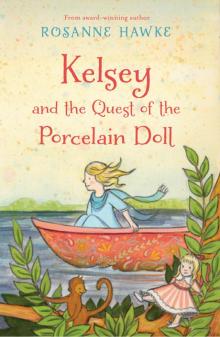 Kelsey and the Quest of the Porcelain Doll
Kelsey and the Quest of the Porcelain Doll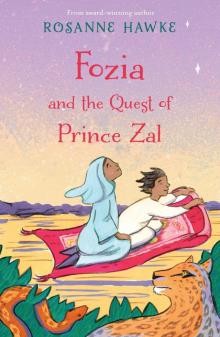 Fozia and the Quest of Prince Zal
Fozia and the Quest of Prince Zal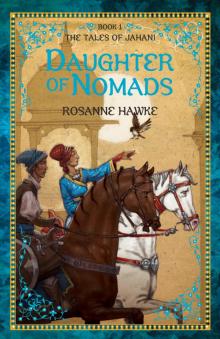 Daughter of Nomads
Daughter of Nomads The Truth About Peacock Blue
The Truth About Peacock Blue Taj and the Great Camel Trek
Taj and the Great Camel Trek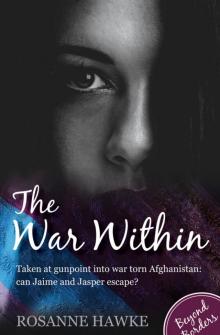 The War Within
The War Within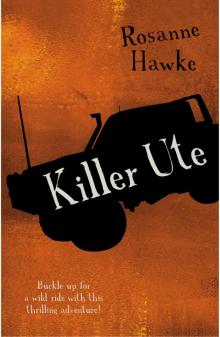 Killer Ute
Killer Ute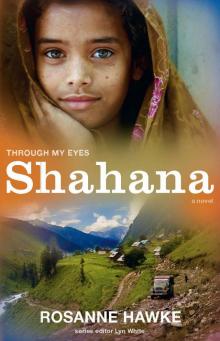 Shahana
Shahana Kerenza: A New Australian
Kerenza: A New Australian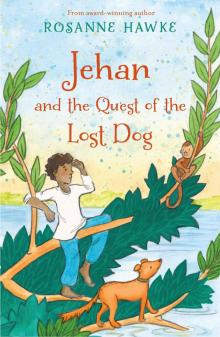 Jehan and the Quest of the Lost Dog
Jehan and the Quest of the Lost Dog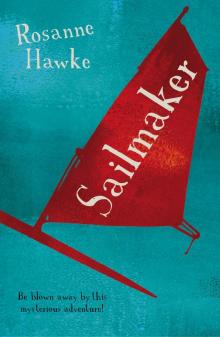 Sailmaker
Sailmaker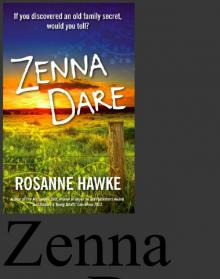 Zenna Dare
Zenna Dare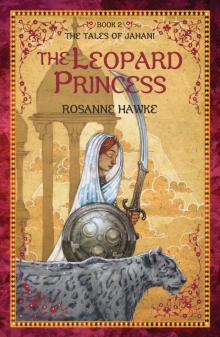 The Leopard Princess
The Leopard Princess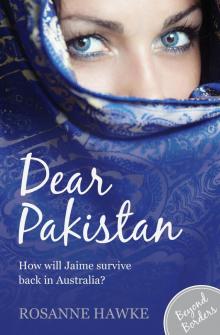 Dear Pakistan
Dear Pakistan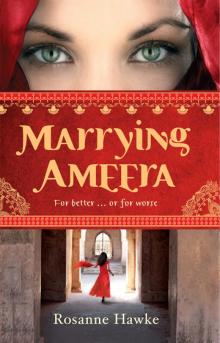 Marrying Ameera
Marrying Ameera Finding Kerra
Finding Kerra Spirit of a Mountain Wolf
Spirit of a Mountain Wolf